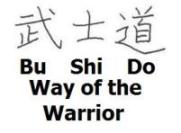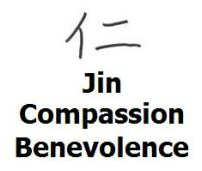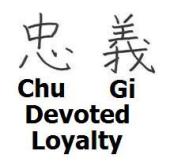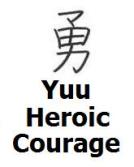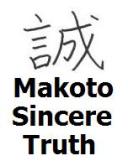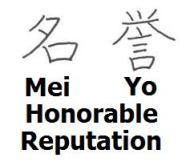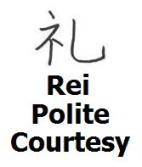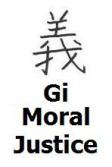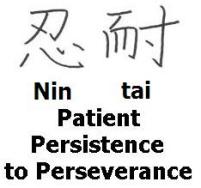Bushido
This is the life that the samurai were committed to: the never ending readiness to give his life, for his overlord, or the Emperor, or for his country. The samurai's duty was to serve his master in peacetime and in war.
A very short summarization of the portion of Japanese history that led to development of "Bushido" the way of the Samurai
Summarized from Samurai Warriors by Stephen Turnbull.
The life style of the Samurai class developed over a number of centuries. There were good and bad leaders and followers. The good leaders adhered to high moral standards and ethics while others lived by varying lesser values and, as in most societies, you will find some who are totally unscrupulous rascals. One thought that is foreign to most Americans is the samurai warrior's "choice or fate" of their life which was often not their own. The basic translation of samurai is "one who serves". The samurai's life was for service to his overlord. The overlords were also samurai and their duty was to serve to the country and the Emperor or the Shogun (the military ruler or defacto ruler of the country). Over the centuries from around 600 AD to 1868 the Emperors were often figure heads and Japan was ruled by various warlords with intermittent Shoguns who would unify the country for a period of time and then power would revert back to warlords and there would be infighting. For some periods of military rule, even the Shogun was a figurehead front for someone who could control but could not hold the title. One of these warlord periods lasted for over 100 years. During that time there was a split in the families who were in line to become emperor and two lines claimed the throne. They set up rival empires with samurai who were fiercely loyal as leaders. The two sides fought back and forth, made and broke alliances. Old ruling families were brought down and new ruling families grew.
That period was ended when Ieyasu Tokugawa completed a unification of Japan that was started by two outstanding generals before him, Oda Nobunaga and Hideyoshi Toyotomi. The Tokugawa Shogunate (military government) started in 1599 with complete control coalescing around 1608 which lasted for just over 250 years. This military government became corrupt and lost power to the merchant class which became very wealthy and powerful during the long interval of peacetime. Another part that contributed to the end of that era was the lack of contact with the world outside of Japan. Once the military government was fully in place, Tokugawa ordered the deportation or killing of all foreigners and eliminated any Christianity or drove it deep underground. Technology outside of Japan advanced while the military government of Japan kept the country in a time capsule of 16th century feudalism and killed any foreigners who dared to enter Japan. I have discovered that the shock wave of advanced warfare technology, far beyond the military government's ability to defend against, started in Okinawa. Commodore Perry was in Okinawa well before his ships appeared in Tokyo Bay. Even though the Shogun knew the Americans were on the way, they had nothing that could stand against the big cannons that were developed during the American Civil War.
The 2004 movie, "The Last Samurai", with actor Tom Cruise, depicted the end of the Tokugawa Shogunate (with a very fictitious story line) and the restoration of power to Emperor Meigi in 1868. In that movie they demonstrated the principles that the Samurai lived by. In the special features portion of the DVD's, it was shown as the Bushido Code in seven principles. I feel they missed one which is displayed throughout the movie, so I am adding persistence to the list. The samurai would carry on despite powerful adversaries and hardships.
So the Eight primary principles of the Samurai are these:
A very short summarization of the portion of Japanese history that led to development of "Bushido" the way of the Samurai
Summarized from Samurai Warriors by Stephen Turnbull.
The life style of the Samurai class developed over a number of centuries. There were good and bad leaders and followers. The good leaders adhered to high moral standards and ethics while others lived by varying lesser values and, as in most societies, you will find some who are totally unscrupulous rascals. One thought that is foreign to most Americans is the samurai warrior's "choice or fate" of their life which was often not their own. The basic translation of samurai is "one who serves". The samurai's life was for service to his overlord. The overlords were also samurai and their duty was to serve to the country and the Emperor or the Shogun (the military ruler or defacto ruler of the country). Over the centuries from around 600 AD to 1868 the Emperors were often figure heads and Japan was ruled by various warlords with intermittent Shoguns who would unify the country for a period of time and then power would revert back to warlords and there would be infighting. For some periods of military rule, even the Shogun was a figurehead front for someone who could control but could not hold the title. One of these warlord periods lasted for over 100 years. During that time there was a split in the families who were in line to become emperor and two lines claimed the throne. They set up rival empires with samurai who were fiercely loyal as leaders. The two sides fought back and forth, made and broke alliances. Old ruling families were brought down and new ruling families grew.
That period was ended when Ieyasu Tokugawa completed a unification of Japan that was started by two outstanding generals before him, Oda Nobunaga and Hideyoshi Toyotomi. The Tokugawa Shogunate (military government) started in 1599 with complete control coalescing around 1608 which lasted for just over 250 years. This military government became corrupt and lost power to the merchant class which became very wealthy and powerful during the long interval of peacetime. Another part that contributed to the end of that era was the lack of contact with the world outside of Japan. Once the military government was fully in place, Tokugawa ordered the deportation or killing of all foreigners and eliminated any Christianity or drove it deep underground. Technology outside of Japan advanced while the military government of Japan kept the country in a time capsule of 16th century feudalism and killed any foreigners who dared to enter Japan. I have discovered that the shock wave of advanced warfare technology, far beyond the military government's ability to defend against, started in Okinawa. Commodore Perry was in Okinawa well before his ships appeared in Tokyo Bay. Even though the Shogun knew the Americans were on the way, they had nothing that could stand against the big cannons that were developed during the American Civil War.
The 2004 movie, "The Last Samurai", with actor Tom Cruise, depicted the end of the Tokugawa Shogunate (with a very fictitious story line) and the restoration of power to Emperor Meigi in 1868. In that movie they demonstrated the principles that the Samurai lived by. In the special features portion of the DVD's, it was shown as the Bushido Code in seven principles. I feel they missed one which is displayed throughout the movie, so I am adding persistence to the list. The samurai would carry on despite powerful adversaries and hardships.
So the Eight primary principles of the Samurai are these:
|
Tom Huffman (352) 494-7816
[email protected] 4424 SW 35th Terrace Suite 4 Gainesville, FL 32608 Copyright © 2002-2020 Aikido of Gainesville, Inc. and Thomas C. Huffman, All Rights Reserved |
|
